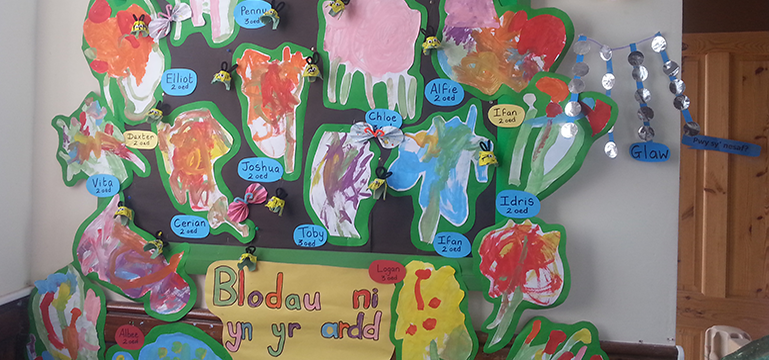Developing Welsh language skills for early years learning

Quick links:
Information about the setting
Context and background to sector-leading practice
Early Years Playgroup Aberporth plans strategically for the successful development of Welsh language provision. Consequently, most children make very strong progress from their starting points, in developing their understanding of Welsh and Welsh language speaking skills. Most children transfer from the setting to the local Welsh medium primary school. During the past year, the setting has appointed a first language Welsh speaking member of staff and currently one member of staff is attending Welsh language learning classes in the local primary school. Practitioners work well as a team to support each other and leaders empower staff to develop their leadership roles and expertise, for example by leading Welsh language focus tasks ‘amser cofrestru’ and storytelling. Practitioners attend Welsh medium training with other bilingual and Welsh medium settings, which further develops their Welsh language skills and understanding.
Description of nature of strategy or activity identified as sector-leading practice
Initially practitioners mapped opportunities within the daily routine activities to introduce Welsh language vocabulary and phrases. Practitioners reflected upon and amended these to help children develop their understanding and responses progressively. They recorded these for all daily routine activities, for example daily registration or ‘amser cylch’, and recording daily weather, number or shape of the day and colour of the week. This ensured accuracy and consistency, and developed confidence regarding vocabulary and phrases introduced by different members of staff. In addition, they noted the correct Welsh language responses expected from children to aid accuracy.
Children take responsibility for leading the daily routine ‘amser cofrestru’ in their role as ‘Helpwr y Dydd’. They take great pride in this responsibility and, due to the daily repetition of vocabulary and phrases, their understanding and confidence in speaking Welsh develop quickly. As children’s Welsh language develops, practitioners increase the vocabulary and language phrases introduced. During the Reception class teacher’s transition visits from the local primary school to the setting, practitioners discuss vocabulary and phrases used in the Reception class daily routines and amend their own provision to support children’s progression and aid smooth transition to school. During ‘amser cylch’, children are divided into two differentiated groups according to age, and this provides an opportunity for staff to introduce very simple phrases to children at an early age before progressing to longer or additional phrases within the older group.
On entering the setting daily, practitioners use Welsh language action songs for children to move. This provides a Welsh ethos and encourages greater understanding and familiarity of vocabulary introduced. They regularly read stories to the children in Welsh, including stories about Welsh culture and folk tales.
Following the success of Welsh language provision in daily routine activities, leaders reflected and identified a need to improve Welsh language provision in continuous provision areas. Practitioners wanted children to use the Welsh language confidently beyond daily routine activities. The local authority Welsh Language Officer and Advisory teacher provided them with language patterns and vocabulary for different areas of continuous provision, such as visual posters and examples of phrases. Practitioners use these as a reference and reminders when children are playing in the different areas, such as creative, role-play, movement and performing areas, to model correct phrases and support their responses.
Practitioners make very good use of resources provided by the local authority Welsh Language Officer, Advisory Teacher and Setting Development Officer. These provide continuous challenge and further support practitioners’ understanding and aid consistency and accuracy in responses. Another key example is a bank of nursery rhymes and songs for the song sack, with illustrated posters and props.
Practitioners work well as a team to support each other with understanding and introducing new Welsh vocabulary, and take advantage of the fluent Welsh speaking member of staff. All are very good language models and develop the children’s understanding and use of Welsh exceptionally well. During the past year, practitioners have made better use of their observations of children’s Welsh language skills development when planning activities and amending daily routine activities to ensure progression. As a result, practitioners introduce Welsh language vocabulary in a variety of focus tasks across different areas of learning, for example mathematical language such as naming shapes, language of measures, and craft activities such as colours and names of materials.
Leaders evaluate their progress using ‘The Active Offer’ document and the outcome of this process supports their continuous focus on developing Welsh language provision. Another strength of Welsh language provision is the activities within the transition programme that has been set up collaboratively with the local primary school and nearby Cylch Meithrin in the village, such as World Book Day, St David’s Day, Harvest Festival and Christmas concerts.
What impact has this work had on provision and learners’ standards?
The sustained work on developing Welsh language provision has ensured that staff are confident in their Welsh language skills and offer high quality provision to children. As a result, most children make excellent progress in understanding and using the Welsh language on a daily basis in their play. Practitioners have higher expectations of themselves and of children’s responses and are increasingly confident in correcting responses and language patterns.
How have you shared your good practice?
Practice is shared with other staff and settings through network meetings and training events. The LA Advisory Teacher and Welsh Language Officer share practice during support visits to other settings and during training events.